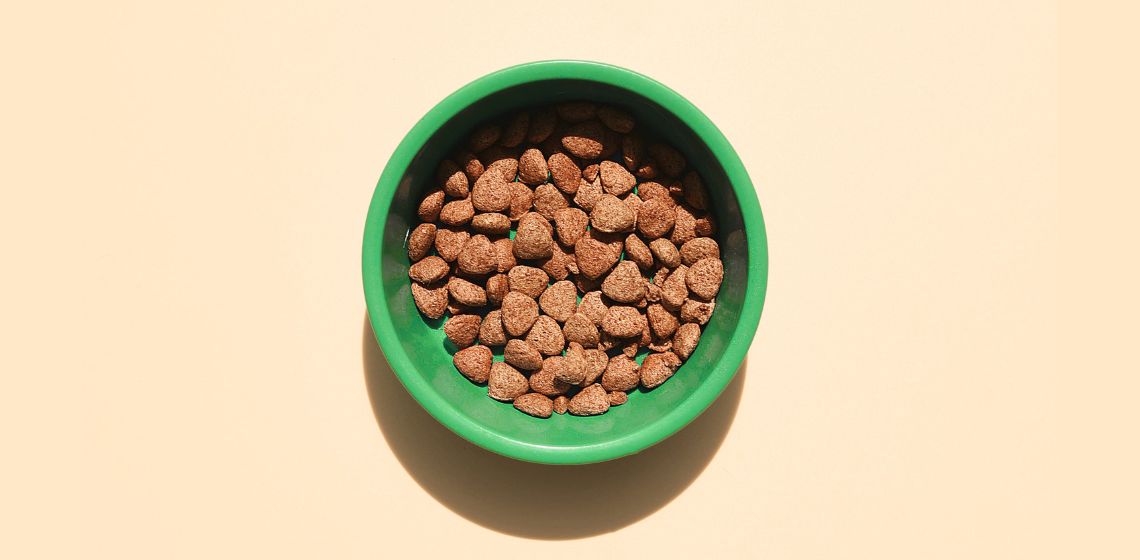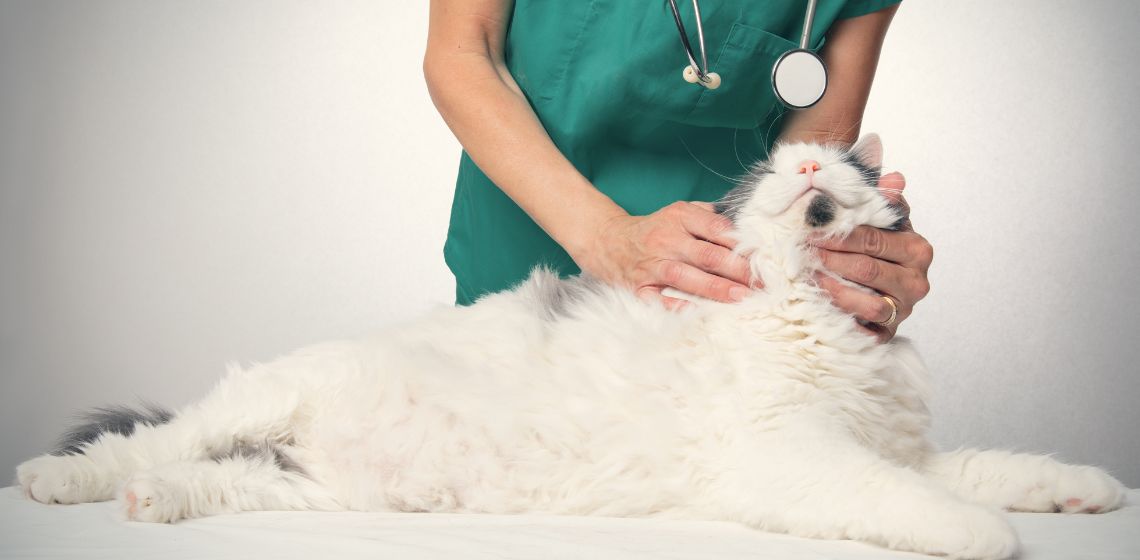Table of Contents
Symptoms of upset stomach in dogs
Stomach upset in dogs most commonly causes diarrhea and/or vomiting. This can come on suddenly (acute) or be a long-term issue (chronic). You may hear your vet refer to it as gastroenteritis, which simply means inflammation of the GI tract. Symptoms often include:
- Vomiting
- Diarrhea – soft stools that are often accompanied by urgency, accidents in the house, and straining (may be mistaken for constipation).
- Drooling, excess salivation, or lip licking – may be a sign of nausea
- Decreased or loss of appetite
- Excessive gas or stomach noises (borborygmi)
- Abdominal pain – dogs may shy away from being touched and picked up or stretch out their front legs in a downward dog or praying position
- Dehydration – may appear as dull, sunken eyes, dry, tacky gums, and prolonged skin tent
- Weight loss
- Other symptoms of underlying disease such as fever, lethargy, weakness, and more
Causes of upset stomach in dogs
Many cases of GI upset are mild and will resolve within 48 hours. However, if an upset stomach does not resolve or is accompanied by other concerning symptoms, it could be an indicator of a more serious underlying issue. Common reasons that dogs are seen at the vet for upset stomach include:
- Dietary indiscretion (meaning your dog has eaten something they shouldn’t have, such as garbage or cat poop)
- Abrupt diet change
- Medication side effect
- Intestinal parasites
- Bacterial or viral infection (parvo, for example)
- Ingestion of a toxin or foreign body
- Food allergy or intolerance
- Stress
- Liver or kidney disease
- Endocrine disease, such as diabetes or Addison’s disease
- Heat stroke
- Pancreatitis
- Inflammatory bowel disease
- Cancer
When to see the vet for vomiting and diarrhea
Whether or not to see your vet for GI upset will depend on several factors, including your dog’s age, health status, and the type and severity of symptoms that they are experiencing. In general, diarrhea is less concerning than vomiting. If your dog is otherwise healthy and acting normal, it’s okay to monitor at home for up to 24-48 hours and try the home remedies listed below. However, there are some times when a dog with an upset stomach needs to be evaluated by a vet as soon as possible:
- Dogs with underlying medical conditions, such as diabetes
- Young puppies, who can become dehydrated and go downhill quickly. Young and unvaccinated dogs are also susceptible to parvo, a life-threatening viral disease.
- Dogs with a history of ingesting a toxin or foreign body
- Diarrhea or vomiting accompanied by other symptoms, such as decreased appetite, low energy level, fever, dehydration, abdominal pain, distended abdomen, non-productive retching, or discomfort
- Persistent vomiting (unable to keep down food or water) or vomiting blood
- Persistent and severe diarrhea or stools that appear black and tarry
- Your dog is getting worse instead of better
- Stomach upset in an otherwise healthy dog that has not resolved with at-home care after 24-48 hours
It’s always important to listen to your gut and seek veterinary care if you are concerned. While many cases of vomiting and diarrhea are mild and easily treatable, some can be severe or even life-threatening.
Veterinary diagnostics and treatments
When you take your dog to the vet for an upset stomach, they will first get a thorough medical history and perform a nose-to-tail physical exam. Your vet will want to know details about your dog’s diet, anything they may have eaten recently when symptoms began, and what symptoms you are noticing.
Further diagnostics may involve blood tests to evaluate organ function and rule out underlying diseases, fecal testing to check for parasites or infections, and imaging such as X-rays or ultrasound to visualize the digestive tract and identify any obstructions or abnormalities. In some cases, more specialized tests like endoscopy or biopsies may be required to obtain a diagnosis.
Treatment will vary depending on the underlying cause of the GI upset. For mild cases, a bland diet and probiotics may be all that’s needed. Medications like antacids, anti-nausea drugs, anti-diarrheal medications, deworming medications, antibiotics, and subcutaneous fluids might be prescribed to manage symptoms and address specific causes. If the upset is caused by a food allergy or sensitivity, a hypoallergenic diet may be recommended. For more chronic or severe cases, additional medications or even surgery may be needed, for example, to remove an intestinal obstruction.
At-home care for mild gastrointestinal upset
For an adult dog who is still eating and drinking normally, has a normal energy level, and is otherwise healthy, the following can be tried at home:
Bland Diet
When your dog is sick, they still need to be consuming nutrients and calories, but in a way that is gentle on the GI tract. Bland diets generally refer to foods that are easy to digest, low fat, and unlikely to upset the stomach. A bland diet can be purchased from your veterinarian, or you can cook it at home. Bland diets typically contain a protein source (such as plain cooked chicken breast or ground turkey) and a carbohydrate source (such as plain cooked white rice or potato) in a 1:2 ratio. It’s important to remember that this diet is not complete and balanced and is only meant for short-term use. Check with your vet to see if they recommend fasting your dog for 12-24 hours before starting to offer small, frequent amounts of bland diet. If your dog is feeling better after a few days, gradually transition back to their regular food.
Probiotics
Probiotics, such as Fortiflora, are live, beneficial bacteria that are similar to the naturally occurring microorganisms in the digestive tract. They have many benefits, including improving digestive health, strengthening the immune system, and may even help dogs with allergies and dental disease. Probiotics are also helpful for both acute and chronic GI disease and can reduce the duration and severity of diarrhea.
Hydration
It’s always important to have fresh water readily available for your pet, but especially if they are sick. Vomiting and diarrhea can quickly lead to dehydration, especially in young or compromised animals. If you have concerns that your pet is dehydrated or they are unable to hold down water, it is important to see your vet.
Monitoring
If stomach upset does not resolve within 24-48 hours, is getting worse instead of better, or is accompanied by additional signs of illness, it is time to schedule an appointment with your vet for testing and treatments.
What not to do
Never give any over-the-counter or prescription medications to your dog without first consulting a vet.
Prevention tips
While it’s not always possible to prevent your dog from getting an upset stomach, there are things you can do to help decrease their risk for some of the most common causes. It’s important to keep up to date with routine veterinary care. Annual vet exams are critical for boosting vaccines to help prevent life-threatening conditions, such as parvo. Screening tests can also catch more concerning causes of vomiting and diarrhea early, when they may be easier and less costly to treat. Lastly, using a veterinary-prescribed broad-spectrum parasite prevention year-round will help prevent intestinal parasites.
At home, be sure to keep toxic or dangerous objects out of your dog’s reach. Teach your dog how to “leave it” and “drop it”. Feed a WSAVA-compliant complete and balanced diet, and avoid excessive treats or table scraps. If you need to change your dog’s diet, be sure to do so gradually over a week.

Liza is a veterinarian who graduated from MSU CVM in 2013 and spent five years working in small animal practice. She loved working with dogs and cats and educating owners on all aspects of veterinary medicine, especially animal behavior and dermatology. She has since transitioned to remote work to be able to spend more time at home with her husband, two young kids, and two cats. She is thrilled to be able to combine her passions for veterinary medicine and writing. She is licensed as a veterinarian in Washington State.











